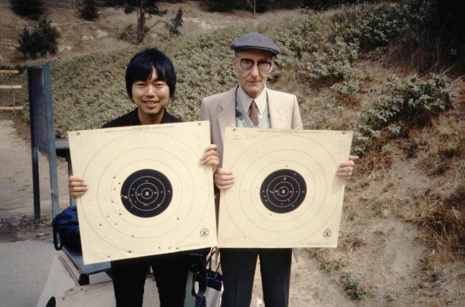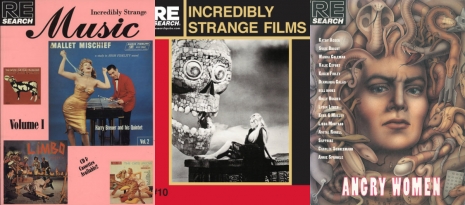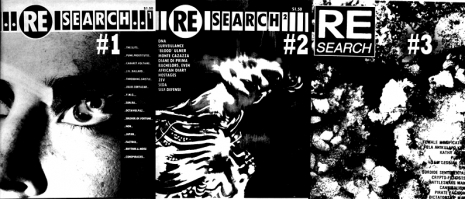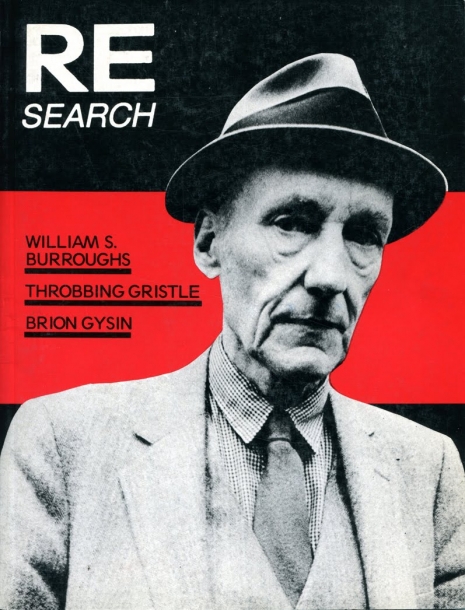
Vale with William Burroughs
This interview with V. Vale was conducted by Michael Lee Nirenberg, director of the 2014 documentary Back Issues: The Hustler Magazine Story
Early in my conversation with publisher and writer V. Vale he called me a “conceptual conversationalist,” although that moniker really belongs to Vale himself. Vale has had an interesting life. He was born in a Japanese-American internment camp in 1944, moved to Haight-Ashbury at the height of the 1960s counterculture movement, joined the original lineup of Blue Cheer, went on to publish punk zine Search and Destroy while working at beatnik bookstore City Lights, and then made his serious mark on the emerging post-punk culture with RE/Search.
For me, the seminal RE/Search journals which Vale has been publishing since the 1980s are a snapshot of culture at its most vital and ideas at their most radical. RE/Search was like early Interview magazine but the interviews were largely unedited, ran long, and each volume more or less tackled a particular subject. Some of the more well-known ones are: Pranks, Incredibly Strange Films, and The Industrial Culture Handbook.
Needless to say Vale’s work has been an influence on me. I met Vale at the New York Art Book Fair last year and interviewed him by phone on April 2, 2017. Below is that conversation edited lightly and segmented because Vale is a stream of consciousness type guy and you have to just roll with him. Enjoy.
______________________________

On interviews and conversations
VV: So I invented a phrase for you while I was waiting for you to call; “conceptual conversationalist.” How’s that?
MN: That’s pretty good, man. All of a sudden I feel like I’m in a RE/Search interview.
VV: (laughs) Well that’s proper. It’s all useful. Conversations are two-way streets.
MN: I agree and I think that’s what attracted me to RE/Search throughout the years, and why I return to the volumes. I wrote out a dozen or so question but that doesn’t mean I have a script I’m going to follow. As you know a conversation takes you elsewhere.
VV: The holy grail of a conversation is when suddenly there appears a concept or an idea that neither person has contemplated before.
MN: Yeah. I agree with that and I think that’s when it’s the most successful.
VV: Whatever. I’m not a success or failure guy, I just observe what’s happening but that’s kinda rare and when it happens it’s a mini cause celebre.
MN: I think that’s a good point. I was wondering if everyone who has ever interviewed you has attempted to do a RE/Search interview on some level.
VV: I don’t really call them interviews, I call them conversations. That gives you a lot more latitude to go into some unexpected direction. Play and humor are like the supreme goal I suppose. I don’t know. I suppose I don’t know how to answer that one (laughs), I just try to have fun with whoever I’m talking to.
MN: Yeah, I think I do the same thing.
VV: Good! Hooray we’re on the same wavelength.
MN: Yeah, it seems obvious that humor is the thing that makes life bearable. And ideas.
VV: Well yeah… ideas. Especially ideas. Yeah, humor of course.

On Capitalism
VV: Oh yeah, ideas especially. The main idea always (laughs) is the overarching theme of how do we make this world a better place? How can we conceptualize a better world? How do we visualize a better world? For example I don’t understand why there aren’t more young artists making films about how life ought to be and dare I say a future that’s post-capitalism. I’m sure you know who (Slavoj) Žižek is and I think the best thing he ever said was, “You can imagine the apocalypse, you can imagine the end of the world, but you can’t imagine a world after capitalism.”
MN: Oh, that’s good.
VV: I’m a capitalist. I make books and hope someone buys them and I obviously need to make a profit so I can pay my rent, but I can’t imagine another system. Boy, if you can you will be the first!
MN: I struggle with this too. For all its flaws, the critiques don’t offer a way out. Look at the countries that went all in with socialism and communism. They started off as such high-minded concepts until they became religion.
VV: Even worse than religion (laughs). I think it’s all patriarchy, but yet I like most ideas of feminism which are actually the same ideas found in anti-racism i.e fighting privilege. There’s that famous saying you probably know which is “privilege confers blinders.” A lot of times if you have privilege you don’t feel it. It doesn’t even exist within the world you’re conceptualizing.
I always said my goal in publishing was (and I stole it from Hegel), “if you’re working, work for more freedom, more consciousness (that’s a great word) and more justice for more people.” The hard thing is the justice because then you get into the grimy world of lawyering and criminality and it’s just so much. Can you imagine if you were a heterosexual seeking a relationship with another heterosexual of the opposite gender. Let’s say complementary gender. I’m not a fan of opposite. I’m a fan of complimentary.
MN: Yes and relativity.
VV: Yes. Can you just imagine a world in which you try to act in perfect justice with another partner? I’m a huge fan of having a partner for a simple reason which is the hardest thing you can do. I’ve never had a job and I managed to support myself mostly and the hardest thing to do is guess what? Make next month’s rent.The other person (your partner) has to worry about the same thing. Take my word for it. It makes life a helluva lot easier and bearable.
On San Francisco
VV: I guess there is one possible window on a future 200 years from now into our world. I’m a huge fan of the minimum income for everyone so you won’t be homeless. San Francisco is nothing but homeless. Everywhere you go. Every block. If you don’t see it, it’s because it’s been removed from the photos in photoshop in all those tourist brochures.
MN: Yeah, I was there two years ago and I couldn’t believe it. I live in New York where we have our own homeless problem, but what’s going on in San Francisco, the wealth disparity is staggering.
VV: You know this, but other cities give them free Greyhound bus tickets to San Francisco because the climate is so mild. You could survive all year sleeping in the streets or sleeping under the freeway or in doorways. It’s not like in New York where you will die during winter and it’s so hot in the summer it’s intolerable. Everyone leaves then. So you know climate has a lot to do with everything. Maybe that’s why Silicon Valley started here. You can work all year round without snowplowing and it never gets hot, it’s an amazing climate to stay inside and work, work work.
Oh and it’s not as hierarchical as New York City. I’ve never lived in New York, well actually as a little kid but I sense a helluva a lot of hierarchy in place and not the freedom to completely reinvent yourself that you get out here. This is still the wild west and you can do anything. If you feel a need you can actually pay your rent.

Vale’s three mentors and collaboration
MN: Something we have in common is a love for dystopian fiction, particularly JG Ballard.
VV: Oh hooray! I didn’t know you loved him! That was my mentor. I had three mentors. One was the surrealist poet Philip Lamantia who everyone calls a beatnik but he was like “No, I’m a surrealist.” The other one was Burroughs who invented his own brand of surrealism, and the third is JG Ballard who called himself a surrealist but was definitely dystopian.
It was Burroughs who said many decades ago “my intentions are not spread all over hell.” That’s why I don’t like 200 people naming them as mentors and all that. Three maybe, but not 200. Although I do like William Gibson a lot. He’s still alive. Any interview or anything he writes I go for it right away and read it. There’s this guy Hugh Howey. I don’t know if you’ve read him. He’s a little too serious for me. Maybe not enough humor. Burroughs, Ballard and Lamantia all had humor and that’s so important to me.
MN: Burroughs was important to me when I was younger. Something about JG Ballard’s books really stuck with me. I’m a fan of William Gibson because I love his ideas but I find him hard to read, but I think it’s because of my own shortcomings. Something about the future dystopian scenarios in Ballard is really appealing to me. I think I’ve read every single one of his books. How did you come to do those RE/Search volumes with him?
VV: Everything in life, in terms of friendship or all human relationships is not just friendships. I’m the sort of person who likes to collaborate with everyone I meet if possible. Right now we are collaborating believe it or not.
MN: Oh yeah. I know it. I sought you out.
VV: You did! Thank you for finding me. Everyone you meet you can collaborate with instantly. In some way. It’s more fun to live this way.I have an outlet in that I publish things on old fashioned paper. Every word you say is important and then I think “I said a bunch of ‘umms’ and uhhs’” (laughs).
MN: (laughs) Maybe those are important too? Maybe those pauses are unofficial punctuation points.
VV: Maybe they give you just a teeny pause just so a new thought can arise in a fraction of a second. I haven’t written an essay on pauses in conversations. The importance of pauses.
MN: I’m sure you can extrapolate. Something like “In Defense of Umm and Uh.”
VV: Yeah, that’s even cleverer. (laughs) I bet you never said that phrase before.
MN: That comes out of this collaboration.
VV: It arose because two people make a “third mind” through talking or having a conversation.
MN: That’s the brilliance of it and that’s something I wanted to ask. Back when you started doing them in the 80s I wanted to ask you what the workflow is like. The edits for those seem to be like a straight transcript, like very little editing at all.
VV: Good! That’s mostly true. Once in a very rare while I will have a really snappy beginning or ending. I will take something from the middle and move it around. That’s pretty rare. I actually try to do as little editing as possible. I’m rarely bored but if something strikes me as laborious to read, I’m guilty of removing that section. That paragraph or whatever.
MN: It’s rarely noticeable in the journals. The conversations are long and in two columns, but they don’t get boring. I think it’s because you’re choosing the right people to talk to with the right temperament. There seems to be an informality. I’m projecting this but bay area culture of the 60s counterculture gives the conversations a loose informality. You have people in the room with you like Boyd Rice or Mark Pauline or someone like that.
VV: You have to have someone with a brain to talk to in a perfect world and those two people you mention are very funny people all the time.
MN: Clearly.
VV: And those are the kind of people you want to be around as much as possible.
MN: Absolutely. I got my people too. (laughs)
VV: I’m sure there’s lots of uncredited people who we both talk to who’ve given us ideas. People we hardly even knew or people on a plane. These days no one ever really talks to you on a plane. They are all on their electronic devices.
MN: Which could be nice. If you’re stuck on a plane next to a talker that could be a rough ride.
VV: Gee, I don’t think that’s ever happened to me. I’m the kind of person that thinks everyone on the planet is interesting and I will give you a reason why. Everyone has an unconscious that consists of every memory, every experience, every person they ever met and their entire life is there and you can’t necessarily access it on demand or by choice but you would be amazed how memories from long ago will pop up and there’s a whole little film strip that starts to play with dialogue and costuming and everything that happened long ago, and because everyone is so deep I think that everyone is interesting. It’s a funny way to look at people.
On punk and Patti Smith and Warhol
MN: What was your first contact with punk. How did it happen for you?
VV: I had an enviable job at City Lights back before computers. The shop was super small. It was actually struggling to survive. It was not yet a tourist destination, supported by tourists from all over the world. People buy their t-shirts, get their photo taken in front of City Lights and all that but way back then in the 70s the store was having trouble surviving. I was younger than I am now. I said “Hey, let’s make some extra money by encouraging mail orders”. So I started the mail order department and I’m the one who typed up the catalog.It was a double-sided sheet of paper on a legal sized sheet so I could cram more book titles on it. I filled all the mail orders as well. That was my job. Another job I had was returning all the magazines that were unsold back to the distributors wherever the heck they came from. Those were great jobs.My third job was taking down all the expired posters on the walls. People put flyers and posters up advertising their underground events. It was what you’d call the nexus of counterculture aspirations. And so um, wait where was I?
MN: I was asking about your first contact with punk.
VV: I read voraciously and this was before computers so I could read everything in the store and a lot of times there was nobody buying anything. Naturally I would devour all the New York papers. I kinda wanted to live there myself but I didn’t like the climate in New York City. There were several papers, but I don’t think they exist anymore like the Soho Weekly News and The East Village Other.
MN: Yeah they are not around.
VV: Or the Village Voice. They had some good reporters who had their ears to the ground for the next up and coming thing. That’s when I became interested. I liked this local guy from San Francisco named Sam Shepard. He became an actor I guess, but I knew him first as a playwright and he was just kind of an interesting-looking guy. Trying to write original work. You know, built on the foundation of the wild west of America or something. This kind of spirit I guess. It turns out that he met and for all I know had an affair with Patti Smith who was trying to be a poet then. So I read about it and she put out her first book and I thought, “God, I’m gonna order it for City Lights.” That was 1973, and it was called Witt. That was from Gotham Book Mart which was a legendary place I always loved to go to. They were really important back then and the place you go to just to find anything radical coming out. This is back in the print days before the internet.
MN: Oh, I know!
(laughter)
VV: Thank goodness you’re old enough to remember.
MN: I feel fortunate about that.
VV: So anyway I order that and sorta became obsessed with Patti Smith. Then it seemed like it wasn’t too long into ‘74, maybe I have the date wrong. Suddenly she put out a 45rpm called “Piss Factory” with “Hey Joe.” I thought I’d better send away for that. So I did and many years later I call her the Joan of Arc of the early punk movement.
MN: So it was through following Sam Shepard’s career you found Patti Smith. That probably led you to The Ramones and everything else?
VV: Yeah but the second part to that is that I was this enormous Andy Warhol fan before he was even a household word.
MN: Me too. The greatest.
VV: I was obsessed so I sent away for the very first issue of Interview which was very funky. They are not like that now. They were really homemade looking, and in one of the early issues was one of the first Ramones interviews I ever read. (laughs)
MN: I too am a huge fan of Andy Warhol. His ideas.
VV: His ideas, yeah.
MN: I love the art too.
VV: For sure. He’s a conceptual artist beyond being a pop artist. He was making films about the Empire State Building and filming it for hours and hours.
On the origins of Search and Destroy
MN: I read that you got a loan from Allen Ginsberg and Lawrence Ferlinghetti when you worked at City Lights to start Search and Destroy right?
VV: Don’t use the word loan. Gift! (laughs)
MN: I stand corrected.
VV: A loan implies you have to pay it back. No. I got gifts from people. No talk about payback as in “I’ll give you money so when you make money I will get a return.” None of that.
________________________
This interview with V. Vale was conducted by Michael Lee Nirenberg, director of the 2014 documentary Back Issues: The Hustler Magazine Story